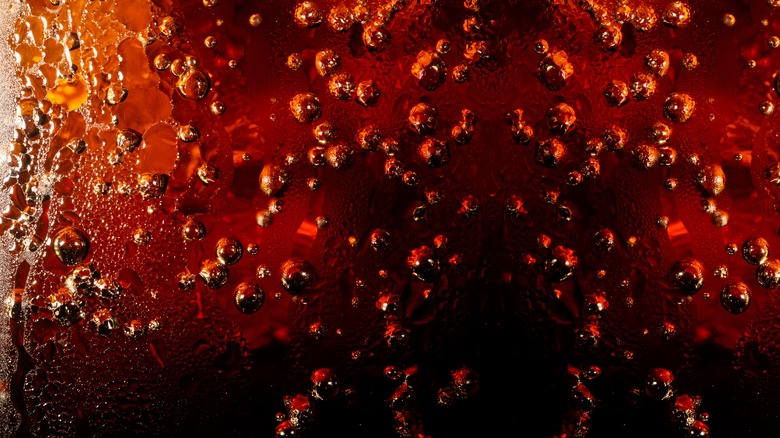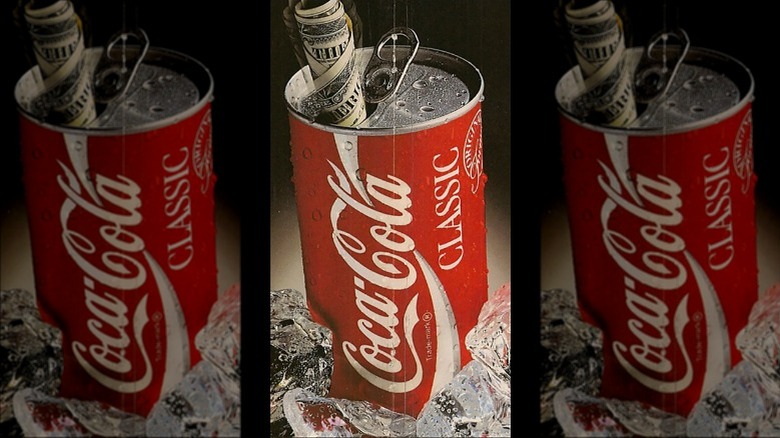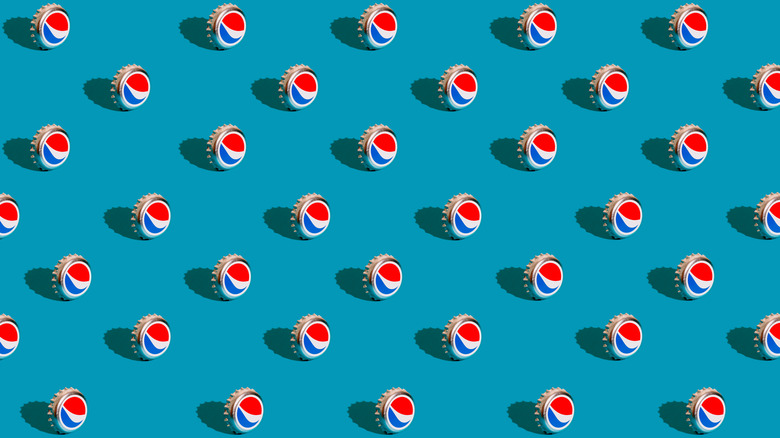MagiCans: The Coca-Cola Sweepstakes That Ended In Disaster
Coca-Cola is arguably the most famous pop of all time, but that didn't happen by accident. A lot of work goes into promoting this beverage, and that's been true since the very beginning. According to the Coca-Cola Company itself, when Dr. John Stith Pemberton created a jug of soda syrup for a Georgia drink fountain, his bookkeeper suggested "Coca-Cola" as the concoction's name because "the two C's would look well [sic] in advertising." Marketing has been a concern from the 19th-century get-go, even if Coke's first newspaper ad simply declared it "the new and popular soda fountain drink."
Things have come quite a long way since then. Per Britannica, Coke is now an American icon, and the Coca-Cola company sells over 2,000 products in more than 200 countries, making it the largest business of its kind globally. Originally, Coke was touted as a medicinal tonic, but by the mid-20th century, the brand's strategy changed to giving consumers options with new packaging like the contoured bottle. Then, in the '80s, Coca-Cola introduced Diet Coca-Cola and the infamously disastrous New Coke. The company soon brought back Coca-Cola Classic, but it needed something else, something exciting to start the '90s off on a good foot.
The answer? The Coca-Cola "MagiCans" sweepstakes.
Participants drank a foul liquid
Unfortunately, in the end, MagiCans were about as disastrous as New Coke was. The idea, as reported at the time by the Buffalo News, was to hide coupons and cash prizes totaling $4 million dollars within hundreds of thousands of Classic Coke cans. The money was systematically split up, ranging from $1 to $500 per can. When somebody opened a winning can, a spring-loaded mechanism would pop the money out.
However, it would be too easy for consumers to just pick cans off the shelves and feel their weight to see which ones contained moolah. Paper bills weigh a lot less than a dozen fluid ounces. So, Coca-Cola created a hidden chamber inside the can that contained water to make it heftier. This was separate from the money, naturally, at least in design. In case anyone got through to it, manufacturers tainted the water with chlorine and foul-smelling ammonium sulfate in order to deter customers from drinking it, per a contemporary New York Times report.
This caused problems since some pop-up mechanisms would malfunction and a few cans had faulty seals, which meant folks could easily access that gross liquid. At least one kid tried the stuff, his parents found out, state health officials were notified, the media picked up the story, and attorneys saw an opportunity in the potential product liability lawsuits. Coca-Cola tried warning the public against drinking the odd concoction and eventually shut down the promotion. MagiCans' magic simply could not last.
Pepsi's promotion resulted in tragedy
Coke or Pepsi? As the Coca-Cola Company blundered, PepsiCo saw its chance to answer that age-old question. According to the New York Times, the rival soft-drink business launched its own marketing campaign right after MagiCans. This time around, people could find at the bottom of "Cool Cans" numbers that corresponded to a prize, and winners would call an 800 number to find out how much cash they earned. However, Cool Cans are mostly remembered nowadays for accidentally spelling out the word "SEX" with their designs when stacked atop one another, per Snopes.
One of the lesser-known facts about Pepsi is that the company held a far more disastrous sweepstakes just a couple of years later (via NPR). It was intended to emulate the lottery, with customers in the Philippines eligible to win one million pesos, which amounted to roughly $40,000, according to the Canadian Broadcasting Company. Given the rough economic conditions there at the time, you can imagine just how eager folks were to win, and they scrambled to collect Pepsi bottles. The issue was, PepsiCo had inadvertently put the winning number (349) on hundreds of thousands of bottle caps. So, when enormous crowds gathered at the business' bottling plants the next day, PepsiCo admitted it was unable to pay up. In anger, some "winners" chucked explosives at those factories, and a handful of individuals were killed in the blasts. It was a truly tragic end to a whole era of soda-company mishaps.


